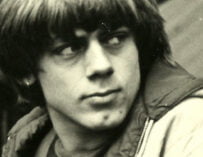We speak with the double Ivor Novello Award-winning lyricist and Squeeze co-founder about his life of creating, collaborating and comedy
Frequently compared with Lennon and McCartney, Chris Difford and Glenn Tilbrook have been lauded as a songwriting duo since their new wave band Squeeze’s first release in 1978. With hits such as Cool For Cats, Up The Junction, Goodbye Girl, Pulling Mussels From The Shell, Tempted, and so many more, the group established themselves as a vital part of quintessential British music.
Although Squeeze disbanded and re-emerged in several incarnations over the subsequent 40 years, Chris continued to write with Glenn and other artists, and has enjoyed a fruitful solo career that even led the songwriter to give stand-up comedy a go at last year’s Edinburgh Festival.
We asked Chris to tell us how their prolific relationship developed and reveal some of the magic behind his approach to songwriting…
So where did it all start?
“I guess I was in my bedroom, in my council house in Blackheath, and I think it was around the time when I had just left school, when I was 16. I didn’t really know what to do with myself but I knew that I had a fondness for writing poems and stories, so I started putting together a little book, a collection of poems. Then I started listening to music and I married the two together, really – the lyrics and the music kind of made sense – so then they became songs. With the help of a neighbour, who had a guitar that I could borrow, he recorded me in 1972 having written like a dozen songs.”
What sort of music was inspiring you back then?
“I was listening to David Bowie a lot, but I was also listening, strangely, to the likes of The MC5 and Iggy Pop. I just enjoyed the noise of all that – just an incredible energy – but it didn’t ever come across in the music that I ended up playing, which is kind of weird.”
Have you still got that early recording?
“Yeah, those recordings were released last year on Demon Records.”
What was the breakthrough moment that took you from just mucking about in your bedroom to something more serious?
“A friend of mine, Barry Bartlett, started a band and he asked me to join, which I did, and it was a folk band so it wasn’t really something I knew anything about, but it was something to do – it became a bit of a pastime rather than an ambition.”
In what capacity did you join the band?
“Drug-dealer I think! But then a couple of years later I put an ad in a sweet shop window and met Glenn Tilbrook, and then the rest of my life was planned out from there.”
What can you remember about that ad?
“It just said that I was looking for a guitarist to join a band. I didn’t really have a band; I just wanted to meet other people who played guitar and hang out with people, and luckily Glenn answered the advert and luckily we got on and started writing songs together, and that became our passion and our life.”
Was he the first and only person to respond to that advert?
“There was one other chap who I didn’t really see eye-to-eye with and he was quite domineering, and I didn’t need that at that point. So Glenn was the second person to answer the ad.”
What was it about Glenn that responded well to? And what did you do when you first met?
“He was just a genius, virtuoso guitar player and that’s what he did 24 hours-a-day: just play guitar. That’s what blew me away about him – he was 15 years old and he could play the guitar like Jimi Hendrix. And he also had an incredibly sweet voice, but I didn’t where that was going to go at that point in time, I was just attracted to his personality, his gentleness and the combination of all.”
How did it progress from there? Did you start writing music straight away?
“Within about four months we started writing songs and then it just became apparent that that’s what we needed to do with our lives. So it didn’t take long. We hit the ground running very quickly, luckily. I don’t know if they were any good or not, to be honest, it didn’t really matter, it was just the process of learning to be in a partnership, I suppose, and be songwriters. So that’s what we did.”
When did Paul Carrack and Jools Holland join you to turn the duo into what we know as the first incarnation of Squeeze?
“About a year afterwards, 1973 or ‘74, something like that. We always wanted to have a band and with Jools playing keyboards that was the nucleus of the band, at that point. It became very apparent that we needed to plug in, make a noise and get our songs heard locally, and that’s exactly
what happened.”
So were those first songs, that you and Glenn wrote together, what made up the first Squeeze album?
“Yeah, pretty much. We were very fluent in those days, so we used to write two or three songs-a-day, sometimes. It was like we were courting each other, in a relationship way, I suppose, and we just really enjoyed the process
of writing.”
Tell us more about that process. Were you really making it up as you went along, or did you have a considered approach, and did that process change over the years and decades that followed?
“No, it became very apparent that Glenn would write the music, sing and produce, and I’d write the lyrics. There was very little conversation about what we did; we kind of respected what our talents were and just let each do what we needed to do, and that formed the nucleus of the Squeeze catalogue, I suspect. In those days, there was nothing else to do but write songs, drink beer, smoke dope and just hang out, but as you get older you get other responsibilities, your mind is taken off in different directions and you lose the concentration – well, I did anyway – to be in a band.”
What order would you tend to approach songs?
“It was always lyrics first and then the music.”
Tell us a little about how you were inspired to write. Did you find words came easily?
“Well, as I say, in those days there was nothing else to do but to write songs, so the creativity came thick and fast, and there was nothing that stood in its way. So when your channels are open, and you’ve got time, then it’s quite easy for inspiration to come and it’s a very exciting process.”



































Related Articles